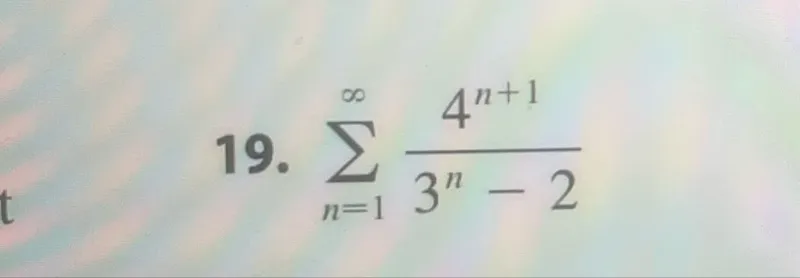Determine the convergence or divergence of the series \(\sum_{n=1}^{\infty} \frac{4^{n+1}}{3^{n}-2}\) using the limit comparison test.
Identify a suitable comparison series.
The given series is \(\sum_{n=1}^{\infty} \frac{4^{n+1}}{3^{n}-2}\). To use the limit comparison test, we choose a series \(\sum_{n=1}^{\infty} b_n\) to compare with. The dominant terms in the numerator and denominator are \(4^{n+1}\) and \(3^n\) respectively. Thus, we compare with the series \(\sum_{n=1}^{\infty} \frac{4^{n+1}}{3^n} = \sum_{n=1}^{\infty} 4 \cdot \left(\frac{4}{3}\right)^n\), which is a geometric series with common ratio \(r = \frac{4}{3}\).
Determine the convergence of the comparison series.
The series \(\sum_{n=1}^{\infty} 4 \cdot \left(\frac{4}{3}\right)^n\) is a geometric series with common ratio \(r = \frac{4}{3}\). Since \(|r| > 1\), this series diverges.
Compute the limit for the limit comparison test.
We compute the limit:
\[
\lim_{n \to \infty} \frac{a_n}{b_n} = \lim_{n \to \infty} \frac{\frac{4^{n+1}}{3^{n}-2}}{\left(\frac{4}{3}\right)^n} = \lim_{n \to \infty} \frac{4^{n+1}}{3^{n}-2} \cdot \frac{3^n}{4^n} = \lim_{n \to \infty} \frac{4^{n+1} \cdot 3^n}{4^n \cdot (3^n - 2)} = \lim_{n \to \infty} \frac{4 \cdot 4^n \cdot 3^n}{4^n \cdot (3^n - 2)} = \lim_{n \to \infty} \frac{4 \cdot 3^n}{3^n - 2} = \lim_{n \to \infty} \frac{4}{1 - \frac{2}{3^n}}
\]
Since \(\lim_{n \to \infty} \frac{2}{3^n} = 0\), we have
\[
\lim_{n \to \infty} \frac{4}{1 - \frac{2}{3^n}} = \frac{4}{1 - 0} = 4
\]
Conclude the convergence or divergence of the original series.
Since the limit is a finite positive number (4), the series \(\sum_{n=1}^{\infty} \frac{4^{n+1}}{3^{n}-2}\) and \(\sum_{n=1}^{\infty} \left(\frac{4}{3}\right)^n\) either both converge or both diverge. Since \(\sum_{n=1}^{\infty} \left(\frac{4}{3}\right)^n\) diverges, the given series \(\sum_{n=1}^{\infty} \frac{4^{n+1}}{3^{n}-2}\) also diverges.
\(\boxed{\text{The series diverges.}}\)
\(\boxed{\text{The series diverges.}}\)

